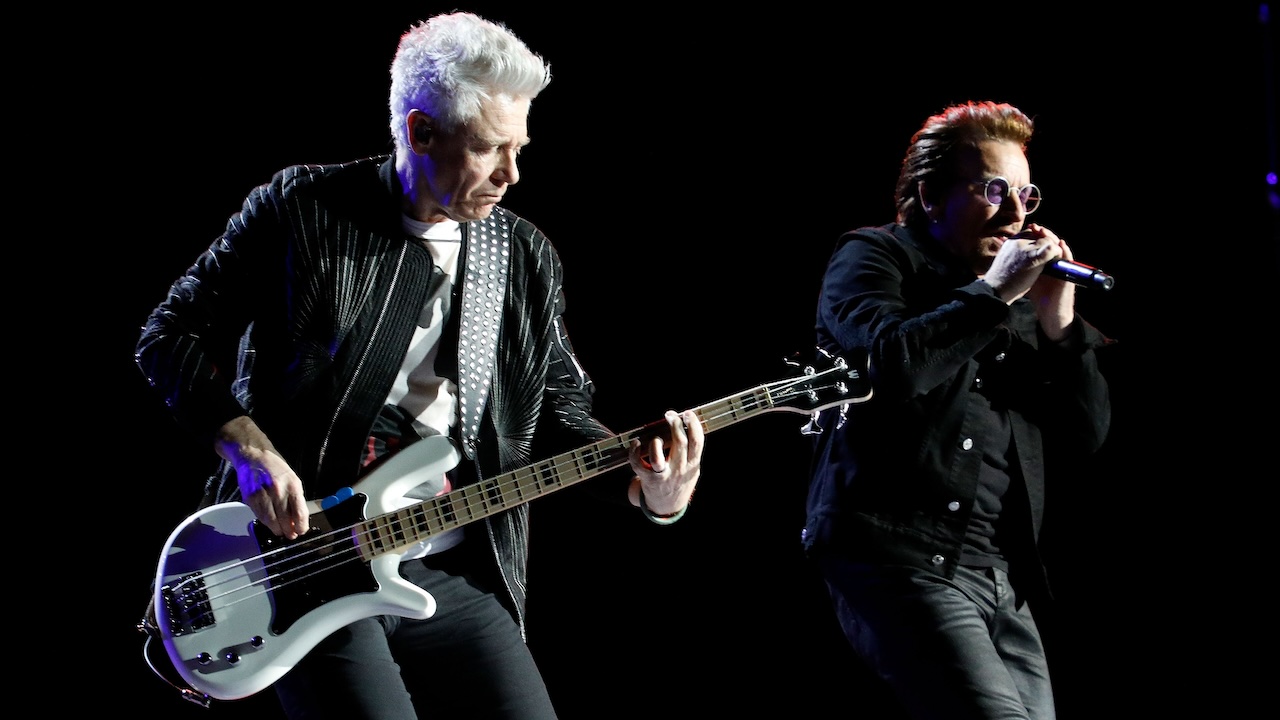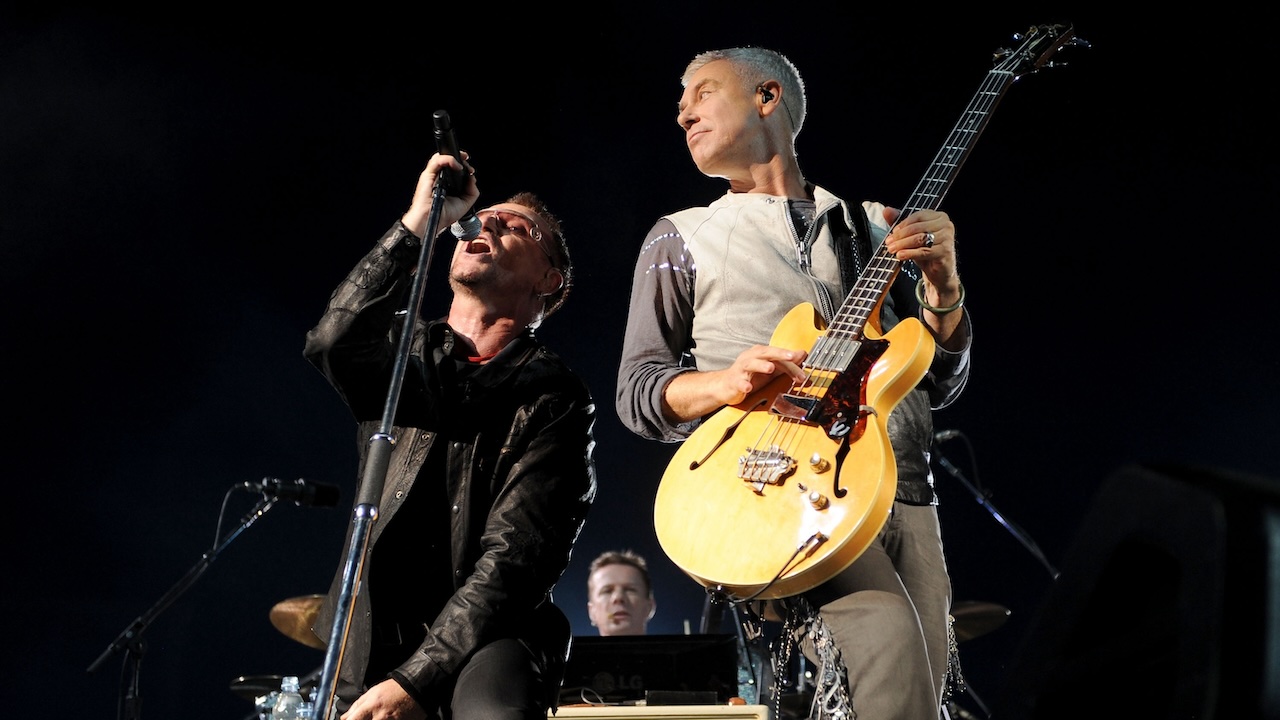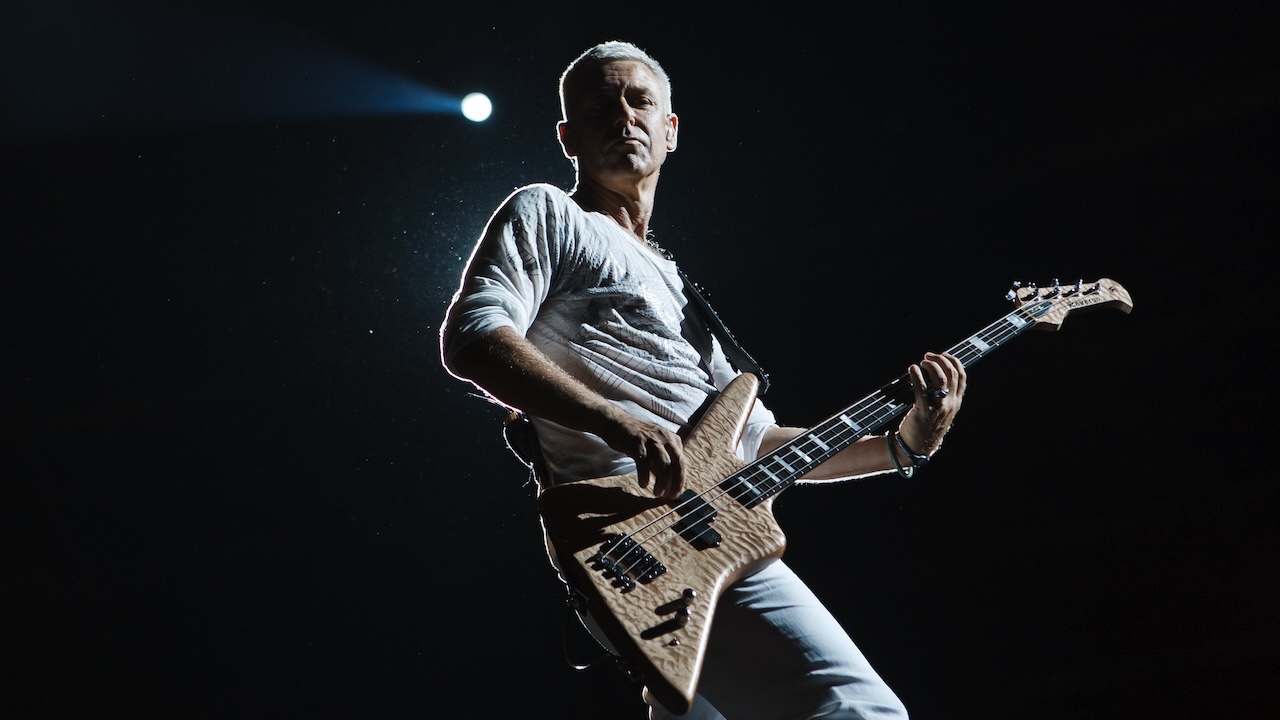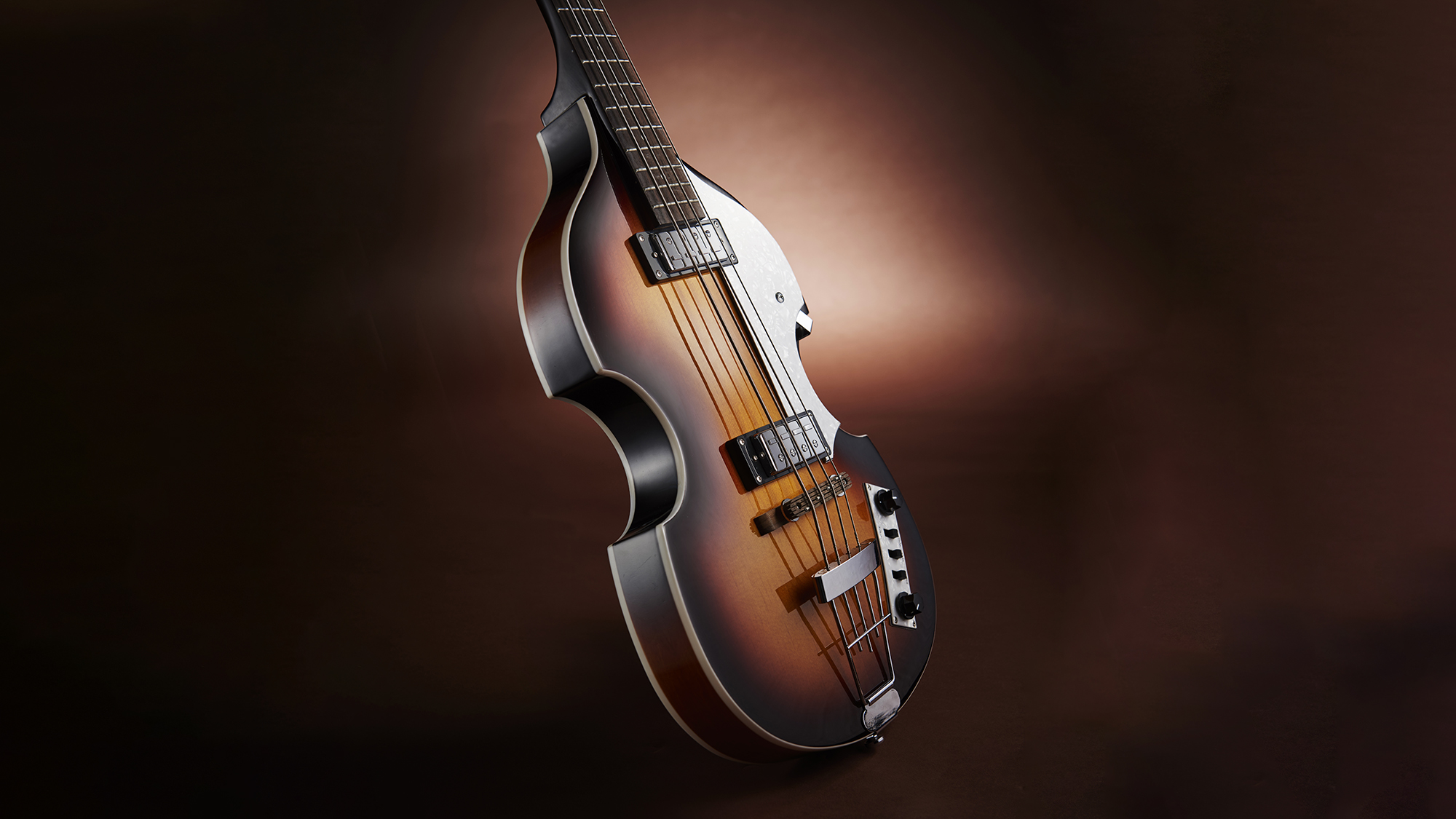“Bono always wanted me to play that part with a pick, but I get a different reaction from playing bass with my fingers. There’s nothing quite like that contact of pulling the wires”: Adam Clayton on the U2 sound

With an engaging frontman, one of the world's most innovative guitarists, and a solid drummer, you don't need to be a rocket scientist to figure out how to play bass guitar in U2: play eighth-notes and hold on for the ride. But there is a deeper story behind the exacting precision in Adam Clayton's style.
When Edge departs mid-song to explore new ethereal melodic worlds, it's Clayton who takes the helm and steers the songs through their changes. And when there's space to fill between Bono's lilting lyrical phrases, Clayton's clever countermelodies answer the call. Whatever the tune, Clayton is there with the perfect bassline and the perfect tone.
A kid from Dublin, Ireland who grew up listening to the Beatles, Clayton is now more than 40 years into his career playing in one of the biggest bands ever, a group of childhood pals who combined forces to rule the music world.
U2 recently brought its tireless exploration of new terrain-styles to the Sphere in Las Vegas. Each night, proving that the chemistry between them is still organic, even after so many years of playing together.
This interview from the Bass Player archives took place in January 2006, following the release of the album, How To Dismantle an Atomic Bomb.
What's the key to putting together a great show?
“We're generally looking for fast songs. Midtempo is hell – you can't have a log-jam of those songs. We'll start with faster tempos and then go into something that's slow, rather than midtempo. That's difficult, because fast songs are much harder to write. We try to set a contour – we build the pace, then bring people back down, then power into the encore. By that time, we have a bit of license to play acoustic songs.”
All the latest guitar news, interviews, lessons, reviews, deals and more, direct to your inbox!
Do you get into a zone before taking the stage?
“If I am preoccupied with other stuff before I go on, it's not a good thing. Your emotional state before you go onstage can determine the show's outcome, and it's crucial to go on in the right state of mind to project confidence. I wish I could be more specific, but I just clear my head and focus.”
When you're playing, do you think about the notes, or do you rely on muscle memory?
“I think it's a mixture of both. I can rely on muscle memory, but if I don't make myself think about the notes, my mind wanders, and that's not what I want in the middle of a gig.”
Do you try to match the emotional vibe of each song?
“Definitely. There's an element of theatre in what we do; getting into character for each song. Call it the Lee Strasberg school of musical performance. It's knowing how to stand, how to hold the bass, and where to be on the stage.
“If I'm not in that character, then I'm not connecting. Maybe that's the big difference when bands play their own songs as opposed to covers. When they're your own songs, you have a deeper relationship with them.”
Edge uses a lot of effects. How does that influence your sound?
“We used to have a rule – it's probably a good one – that only one instrument could have an effect on it at any time. It's usually Edge. In the early days I'd goof around with chorusing, phasing, and flanging, which I'd sometimes use as a seasoning with distortion.”
Do you and Edge still tune down for some songs?
“Yeah, that's an old hangover from the way we used to do things. We would always tune down a half-step to give Bono a bit more headroom.”

Do you also tune down so you can use more open strings?
“Exactly. That's why there are so many instrument changes during the show. I wish I could just put one bass on and play it the whole way through.”
When you're writing basslines, do you start with an idea, or do you experiment until you find something you like?
“I always have a starting point in my head. A lot of times it's how I hear the drums. When I hear a drum part, I react instinctively: either to push against it, to go under it, or to go around it. Bass and drums need to have chemistry – to talk to each other.”
What's the hard part of your job?
“I don't have the kind of technique that allows me to get through ideas quickly and easily. I'm instinctive when it comes to looking for a different sound. I start with the opposite of what I feel has been done before, and often that's something I don't find easy to play.
“From that extreme position, I bring it back to the centre and gradually refine it until it's more conventional. If you start in the obvious place, it's hard to get into new territory.”
Do you ever try to pull yourself back from playing too much?
“No. Sometimes I get a little frustrated by always playing eighth-notes. But at the end of the day, we perform songs live, and that's what works. Eighth-notes drive the band, they're propulsive, and they form a foundation for what Edge and Bono are doing. There are only so many different ways of doing it.”
It seems like you do find different ways to play eighth-notes, for example, by using either your fingers or a pick. On Beautiful Day, which has a driving eighth-note line, you play with your fingers. Why?
“You know, Bono always wanted me to play that part with a pick, because he saw it as a more driving, percussive line. But I found it very hard to play that particular riff with a pick. I could hear it and play it with my fingers, but every time I tried it with a pick, I’d fumble. I don’t know why.
“Now I think that if I used a pick, it would be a little mundane, because you'd have the bass and guitar just driving the same riff, and it wouldn’t be as sexy as going under the guitar part with my fingers.
“I get a different physical reaction from playing with my fingers. There's nothing quite like that contact of pulling the wires.”
On slower songs like Sometimes You Can't Make It on Your Own, you're holding long notes. When you don't have the driving rhythm, how do you feel the groove?
“That song was very problematic, because it was a midtempo tune with a descending chord sequence. I find those to be like black holes; you have to go with them! When we were working on that in the studio, Edge was changing some of the root chords to try to break it up, but it was still a descending sequence. It was frustrating, because I couldn't get a bass part to work over it.
“We wanted to give it a twist, to go against the predictability and inevitability of ending up down on that F#. The end result is a hybrid. I followed the roots, and then during the playback, I noodled with a figure up around the 12th fret that could run through the whole tune. We tried using just that figure, but then we were missing the chord changes. In the end we put the two parts together.
“There's no real way of playing that live, so we've got a sequencer that covers the roots while I play the higher melodic part. It's a beautiful little countermelody. That's as much a part of what I do as the eighth-notes – I've always had a desire to pull some melody out, to give some counterpoint to what's going on.”
What other bass players do you feel are really good at that?
“I've always been hugely respectful of Peter Hook. He's always managed to weave a melancholic, melodic thread through Joy Division and New Order. The problem is that sometimes the root isn't there, and that's not U2 – we need the root for what we do.”
On Boy, you played open-string drones like Peter Hook on Out of Control and The Electric Co.
“Early on, we didn't have very good equipment, and the bass was rarely in the PA. So I always figured if two strings were going instead of one, you get a bit more volume. Also, at the time Edge was playing very minimal guitar melodies, and this was a way of getting more power into those songs. That was great for what we were, which was essentially a three-piece band.”
How did that affect your own playing?
“I'm so grateful we never had a keyboard player until much later, because keyboards just cover everything up. With just Edge and Larry, if there was real estate that wasn't being exploited, it was very obvious. It produced an economy in my early playing, but it also produced an atmosphere of risk – to try and get something else happening in that space.
“But part of the U2 sound is that openness. Sometimes it's a big decision to say, 'You know what, I am just going to do boom-boom here, and nothing else.’ I'm much more comfortable doing that now than I was back then, where everything had to count. Like Vertigo, which is just a riff with nothing else going on: it's a pure situation; it's perfect.”
Yet you have your own way of phrasing that line.
“Those are the things that as a bass player, when you come upon something like that riff, you go, ‘Oh – I can make this a bass part rather than a guitar part.’ And I think they make a difference. It gives it a bit more dimension."
Do you get emotionally attached to the instruments you play?
“Not really. I have a '73 Precision Bass that I've used since day one. I used to think, ‘This is the old workhorse – old faithful.’ I loved it. I still love it, and I play it all the time, but I'm not so attached to any of the others. I'll play them for a bit and then move on.
“There's an amazing difference with vintage basses compared to regular stock instruments. I love finding instruments that have had a life before you got them. They bring something to you.”
What do you look for in basses?
“I love bottom-end – I'm a low-end junkie. But for these kinds of shows, and for being in a rock band, I need a bit of swagger – the sound Entwistle and J.J. Burnel used to get, where the bass is strong on the upper mids, warm and throaty. I don't like too much high-end – high-end hurts me. Especially back when we were experimenting with the dance club sound, I was looking for a big bottom-end. I wanted to really get underneath everything.”
Is the band conscious of having "a sound"?
“Yeah, I think we are, but not because we want to remain true to that – we want to know how far from it we can go. We really push ideas to their extreme to find different sounds. Then, once we're aware of the different possibilities, we ask what represents us and where we are coming from.”
Are you guys usually on the same page when it comes to that?
“Usually. Sometimes there's a bit of a struggle for everyone to agree, but generally, if one person doesn't agree, they then defer to the other three. It's quite a good process of protecting the band's ability to make decisions.”

How have you progressed as a musician and bass player over the years?
“Sometimes I don't feel like I've progressed very much. But I do feel that there's a precision that's come into my playing that wasn't there before.
“I'm not sure if that economy is growth or atrophy. But Edge always says that notes sound different when I play them. I guess that’s it – without thinking, I just know which notes to play, how hard to hit them, and how long to hold them. Now I just make better decisions more quickly.
“What I do is probably not that extraordinary – l'm sure somebody else could do it. But they would make different choices. In the end, it's just personality.”
